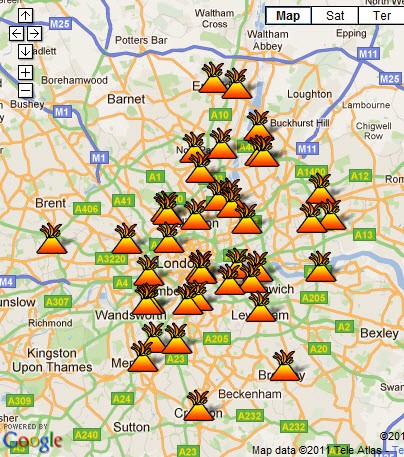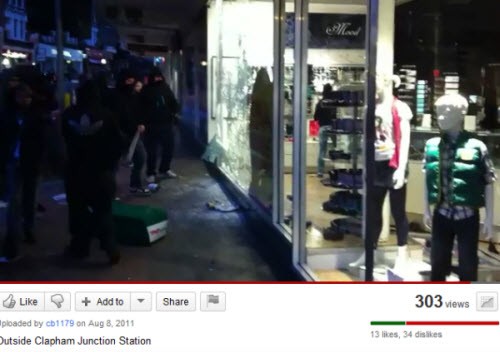In the 24 hours since this story was first published, the unrest in the UK has seen 16,000 police sent to London while looting and violence has begun spreading to areas including Birmingham, Manchester, Liverpool, Bristol, Salford and Nottingham. Keep an eye on The Guardian liveblog for the latest updates.
Outside my North London flat tonight the sound of sirens has been more or less constant, sometimes accompanied by the whir of not-so distant helicopters.
The web is alive with stories and footage of smoke and fire, property destroyed, violent upheaval and hundreds of arrests. The stiff cool breeze is unsettling and there is an uncanny charge to the air.
London is convulsed with riots and the unrest is apparently spreading to other cities, with unconfirmed reports of disturbances in Birmingham and Liverpool. The UK government, having dismissed the prospect of civil disorder less than one year ago has been caught unawares and there is now speculation about bringing in the military to help restore order. The mood among those ordinary Londoners with whom I have talked today is one of genuine shock at the extent to which things feel out of control.
@JamesCridland on Twitter, managing director of MediaUK.com has created this Google map charting the disturbances
The United Kingdom is in the midst of a broader crisis of legitimacy. The ruinous war in Iraq, the global financial debacle, Westminster’s parliamentary expenses furore of 2009-2010, the current government’s malevolent austerity measures, the News of the World hacking outrage and a litany of other lesser scandals real and imagined, have left trust in the UK’s elites and institutions at historically low levels.
It has not helped perceptions this week that — as “London burns” — the Prime Minister, the Deputy Prime Minister and the Chancellor of the UK, as well as the mayor of London, have all been away on their holidays. Last month the UK Prime Minister badly underestimated the public anger directed towards News of the World following revelations that young murder victim Milly Dowler’s phone had been hacked, and Cameron has now — by not returning from his leave immediately — again seriously misjudged the public mood.
The current trouble began with the mysterious shooting of a man in Tottenham, but the rioting and destruction that is now enveloping parts of London and other cities has evolved in to something largely unconnected with the event that triggered the disorder. Already bitter contests over the meanings of the riots are under way.
It is innately hazardous to attempt interpretation with events still so fluid, but what we are presently seeing appears motivated by materialism and the sheer thrill of aggression; a criminal grab by disaffected urban youth, socially excluded and apparently unbound from social convention and restraint. Indeed, it seems almost a source of disappointment that the riots do not have any particular air of principle about them at this stage. In some ways it would be easier to understand the unrest if it was more overtly political, as with recent protests in Greece, Spain or the Arab world. But there are no slogans to be heard.
London riots hit Clapham Junction Debenhams
The mere hooliganism and blatant avarice of the rioters is ironic and affronting, given the number of issues that citizens in the UK might be genuinely furious about. As one popular tweet from the past 24 hours wryly observed:
“The Youth of the Middle East rise up for basic freedoms.The Youth of London rise up for a HD ready 42″ Plasma TV.”
Yet although the motives of the rioters may not be political, the origins of the riots still lie in politics. Successive Tory, New Labour and Tory-Liberal Coalition governments have pursued neo-liberal pro-market policies, corroding the public realm and the glue that binds society together, and at the cost of sharply rising inequality.
This has been matched by the emergence of a culture of selfish materialism, lack of personal restraint and conspicuous consumption. As one expert told The Guardian today, commenting on the mindset of the looters:
“Where we used to be defined by what we did, now we are defined by what we buy. These big stores are in the business of tempting [the consumer] and then suddenly these people find they can just walk into the shop and have it all.”
None of this in any way excuses or exculpates the criminal culpability or irresponsibility of those involved in the violence or destruction. But in a society that has so valorised self-maximising pursuit of wealth we should not be so surprised at the eruption of this grimly violent shadow of the mainstream.









“The mindset of the looters” eh? So the poor dears just couldnt handle the temptation – god help us!
A reasonable summary of events, thanks, David, but why the fencesitting? Seems as though you do believe that this is — even subconsciously on the part of some — a political movement, and that the deep social inequality in the UK is a major impetus.
It’s amazing how thoroughly gormless many politicians are. After the first torching one would expect Cameron to pick up the phone to order the government jet back home to the UK.
Perhaps this is why politicians so earnestly feed off polls – they seem to lack insight into the electorate as well as basic skills in assessing the public mood.
Yes I was a little bit surprised to hear of this this morning. I do think the austerity measures must have contributed to the ongoing disturbances but I am confused about the open rioting in cities with the greatest number of security cameras in the world. Surely people know they will be caught and punished.
Something is afoot and the relentless de-politicisation of our Anglo societies for the last few decades means it manifests in these mindless ways (unlike Greece, the Middle East, etc.). But that shouldn’t obscure the fact that there is a deep-seated anger and dissatisfaction amongst large numbers of people – the mindless Vancouver hockey riots a few months ago were another example.
Blaming greed or social media or other mindless explanations blind us to the essentially political nature of these events. The fact that the surveillance state and a huge standing police force haven’t been able to quell it is testament to the strength of these feelings.
Fascinating how much hysterical coverage is given to this violence, compared to the violence we have (and continue to) inflicted on Iraq and Afghanistan.